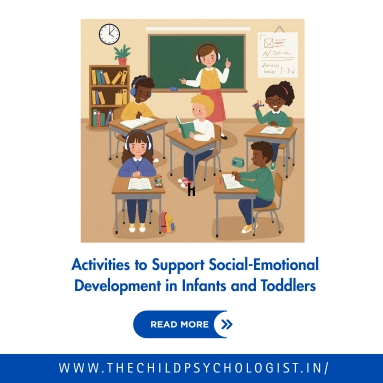The early years of a child’s life are a period of rapid brain development and emotional growth. During this crucial time, infants and toddlers begin forming their first relationships, learning how to express emotions, and understanding the world around them. Engaging in activities that support social-emotional development can set a strong foundation for mental well-being and future success. Whether you’re a parent, or caregiver, or looking for guidance from a psychological counsellor in Indore, these hands-on strategies and activities can help your little one thrive emotionally.
Activities for Infants (Birth to 18 Months)
1. Close Contact and Cuddling
Frequent cuddling, skin-to-skin contact, and eye contact help babies feel loved and secure. When a caregiver holds and soothes an infant, it not only fosters bonding but also helps regulate the baby’s emotions.
2. Storytime with Feelings
Choose simple books with expressive faces and emotions. While reading, label the feelings of the characters — “Look, the baby is sad. Can you see the tears?” This early exposure helps infants begin to recognize and name emotions.
3. Puppet Talk
Use soft puppets to show basic emotions like happy, sad, or angry. Act out simple scenes like, “The bear is sad because he lost his toy.” Over time, your baby will start connecting expressions with emotions.
Activities for Young Toddlers (18 Months to 2 Years)
1. Pretend to Play with Toys
Use dolls, stuffed animals, or toy figures to act out simple situations: “Teddy is crying. What can we do to help?” These role-play sessions help toddlers develop empathy and emotional intelligence.
2. My Feelings Book
Make a small DIY book using real photos of your toddler showing different expressions: smiling, frowning, laughing, crying. Flip through it regularly and talk about what they were feeling and why.
3. Emotion Songs
Modify classic children’s songs to include emotions. For example:
- “If you’re happy and you know it, clap your hands…”
- “If you’re mad and you know it, stomp your feet…”
This playful approach makes learning about feelings fun and memorable.
Strategies for Parents and Caregivers
Understand Your Child’s Temperament
Each child is unique. Some may be naturally calm, while others are more sensitive or reactive. Recognizing and respecting your child’s temperament allows you to tailor your parenting approach and better support their emotional development.
Model Healthy Expression
Children learn by observing. Show them how you handle frustration, sadness, or excitement. Use statements like, “I feel upset, so I’m going to take deep breaths.” This teaches them positive ways to manage emotions.
Be Consistently Responsive
Responding to your child’s emotional needs with comfort and patience builds trust. When toddlers feel safe and understood, they’re more likely to express themselves in healthy ways.
When to Seek Support
If you notice your child struggling with social-emotional development or behavior, it may be helpful to talk to a professional. A psychological counsellor in Indore or a certified kids therapist near me can offer personalized guidance, emotional support, and developmental strategies. Early intervention plays a key role in helping children navigate emotional challenges.
Supporting your child’s social-emotional development from an early age sets the stage for lifelong success. Through simple yet meaningful activities like storytelling, pretend play and emotional role modeling, you empower your child to understand themselves and others better. And when needed, don’t hesitate to seek help from a kids therapist near you or a psychological counsellor in Indore — because every child deserves the best emotional start in life.
